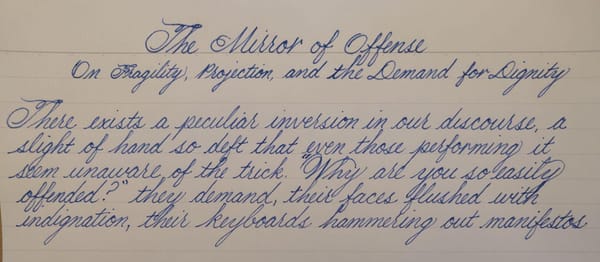The Inconvenient Truths about 'ABC of my Trans Adventure, Part Two'
Unraveling the Biases and Misinformation
Here is a link to part one, two, three, and four.
B is for Busting Biases and Bogus Beliefs
In response to the recent article 'The ABC of My Trans Adventure, Part Two'1, we at pittpeople.substack.com feel compelled to address the numerous inaccuracies, logical fallacies, misinformation, and harmful stereotypes presented. I can’t say it is exhaustive or complete, as I will not deconstruct the entire article and its references sentence for sentence. That is not necessary to expose the original article for what it is. As an growing group dedicated to promoting truth and understanding, and to de-radicalize parents in crisis, we believe it is crucial to counter misinformation with facts and evidence. In this article, we will take a look at the claims being made and what the facts say.
So let’s get started:
Ad hominem attacks and inflammatory language:
Argument from the article: "As Jonathon Von Maren, a talented journalist who has written extensively on trans issues, states: 'The primary characteristic of transgender activists is an unyielding misogynistic cruelty' and also, 'Trans activists treat women and girls with contempt and cruelty'."
The article uses an ad hominem attack by quoting Jonathon Von Maren, who makes a sweeping generalization about transgender activists. This attack on the character of transgender activists is used to discredit their arguments and intentions without engaging with the substance of their positions2. It is important to note that making broad, negative generalizations about a group of people is fallacious and misleading. It is an attempt to discredit trans folks and activists while ignoring the facts or points raised by them. It does this by casting doubts and aspersions on the person or group of people instead. This usually means “we got nothing, so we make stuff up and call names”.
Furthermore, the article fails to provide evidence to support the claims they make, relying instead on the opinion of a single journalist who is presented as an authority on the subject. It is important to note that being a journalist who has written extensively on a topic does not necessarily make one an authority on that subject. If we look into who this journalist is, we find that Jonathon Von Maren is a conservative writer and podcaster who has expressed his opinions on transgender issues. However, his work is primarily opinion-based (not fact or research based) and published on platforms that align with his conservative views. 34
When discussing topics like transgender rights, it is important to rely on the expertise of professionals who have conducted rigorous, peer-reviewed research in relevant fields.56
Hasty generalization:
Argument from the article: "Those frauds, and the bastards who support and enable them, have zero regard for the feelings, well-being and safety of women..."
This claim is a harmful generalization that dehumanizes transgender individuals and their supporters. It is inaccurate to suggest that all transgender people and their allies disregard the safety and well-being of women. In fact, we see a plethora of evidence that transgender rights advocates seek to create a more inclusive society for everyone, including cisgender women7.Misrepresentation of events:
Argument from the article: The article misrepresents the reasons behind the defunding of the Vancouver Rape Relief Center, suggesting it was solely because they refused to "welcome men who believe they are women."
The decision to defund the Vancouver Rape Relief Center was based on the center's exclusionary policy towards transgender women, which was found to be discriminatory8 . The article fails to acknowledge the importance of inclusive policies in support services for all survivors of sexual violence 9.
Misleading portrayal of statements:
Argument from the article: The article mischaracterizes the Edinburgh Rape Crisis Centre's email, suggesting that it dismisses the concerns of women who feel unsafe around transgender women. I won’t directly quote the original post, because it is lengthy and, well, awful. You can read it and look for the section that start with “To women who feel threatened and unsafe by the presence of trans 'women'…” and the following two or three sentences should be enough.
The article mischaracterizes the Edinburgh Rape Crisis Centre's approach to supporting survivors with concerns about transgender inclusion. Furthermore it is taking the quotes from the article it references, which is in and of itself an article quote a podcast, out of context. Here is the full text section they are referencing:
On the Podcast, Wadhwa said (emphasis mine):“some rape survivors may be worried about the presence of trans women - people born male but who identify as female - in women’s organisations.
“So we might have fear of men of a certain ethnicity, we mighty have fear of trans people.”
She went on: “Sexual violence happens to bigoted people as well. It is not a discerning crime. But these spaces are also for you. But if you bring unacceptable beliefs that are discriminatory in nature, we will begin to work with you on your journey of recovery from trauma.
But please also expect to be challenged on your prejudices.
If you have to reframe your trauma, I think it is important as part of that reframing, having a more positive relationship with it, where it becomes a story that empowers you and allows you to go and do other more beautiful things with your life, you also have to reframe your relationship with prejudice. Otherwise, you can’t realy, in my view, recover from trauma and I think that’s a very important message that I am often discussing with my colleagues at Edinburgh Rape Crisis.”
While the full context of the email is not available, it is essential for support services to prioritize trauma-informed care and to address survivors' concerns with sensitivity and understanding 10. Promoting inclusivity and non-discrimination is important, but it should be done in a way that does not minimize or dismiss the experiences and feelings of survivors 11. Trauma-informed care involves creating a safe, supportive environment that empowers survivors and respects their individual needs and boundaries 12. This is what Wadhwa and Edinburgh Rape Crisis was trying to convey, albeit perhaps not in the most accessible or indirect manner.Dismissing valid therapeutic techniques:
Argument from the article: It dismisses the concept of "reframing trauma" as a way to accommodate transgender women, suggesting that it is an insensitive and inappropriate approach to supporting survivors of sexual violence. However, this interpretation misrepresents the purpose and application of cognitive reframing in trauma recovery.
Cognitive reframing is a well-established therapeutic technique that helps individuals process their experiences and develop coping strategies13 . It is not about dismissing or minimizing the severity of trauma but rather about helping survivors find ways to manage their emotions and work towards healing 14. Reframing is not used to "accommodate" anyone but to support the survivor in their own recovery process.
The article's portrayal of reframing as "kicking yourself in the ass and using mind power to reassess your shit" is a gross oversimplification and mischaracterization of the technique. Trauma-informed care, which includes cognitive reframing, is a sensitive and gradual process that respects the survivor's experiences and boundaries15 16. It is not about forcing survivors to change their perceptions overnight or to disregard their own feelings.
Furthermore, the article's framing of the issue as a matter of "accommodating men who delude themselves into thinking they are women" is both inaccurate and insensitive. It dismisses the lived experiences of transgender individuals and fails to acknowledge the complex nature of gender identity 1718.
Cherry-picking and one-sided presentation of cases:
Argument from the article: The article discusses the Jessica Yaniv case as an example of transgender women's disregard for others.
The Jessica Yaniv case is an isolated incident and not representative of the transgender community as a whole. The article fails to provide a balanced perspective and ignores the numerous cases where transgender individuals have been victims of discrimination and violence [9].
The article also uses Scott Smith’s daughter as an example of a trans person committing sexual assault or rape in the bathroom. But this has been repeatedly and open refuted by the parents and school staff of the teen charged with the assault “His mother and teachers denied claims on the right that he was “gender-fluid.”19This person was not trans. Yet the authors use this as a convenient attack against trans people.
Ultimately the actions and misdeeds of a few do not condemn the masses.Unsupported claims:
Argument from the article: "...they are painfully aware that the authentic biological realities of females, such as pregnancy, menstruation, real breastfeeding, etc.., are out of their reach."
”The notion that trans people are unaware of, or deny, our anatomy or chromosomes is a straw man argument. I have never met a trans person who is unaware of the biological sex they were assigned at birth. Indeed, the fact that we identify and live as members of a gender other than the one we were assigned is a testament to our awareness of this contradiction." 20Serano further explains that acknowledging biological differences does not negate the validity of transgender identities or the importance of social and legal recognition of their gender.
Dehumanizing language:
Argument from the article: The article refers to transgender women as "frauds" and "bastards."
Using dehumanizing language to refer to transgender individuals is unacceptable and contributes to a climate of hostility and discrimination. Such language has no place in a respectful, fact-based discussion 21.
Moreover, the use of terms like "frauds" and "bastards" reveals the author's deep-seated bias and prejudice against transgender individuals. By reducing transgender women to these derogatory labels, the author strips them of their humanity and dignity, promoting an "us vs. them" mentality that fuels discrimination and hatred22 .Appeal to emotion and hyperbole:
Argument from the article: "I pray for the day when the current trans insanity will be remembered as a time of despicable madness and horrific abuse against women, children and families..."
This statement is not only hyperbolic and emotionally charged but also deeply problematic in its use of prayer to express harmful and discriminatory views. By framing the "current trans insanity" as a time of "despicable madness and horrific abuse," the author employs inflammatory language to stoke fear and prejudice against transgender individuals and their allies 23.Moreover, the use of prayer in this context is particularly concerning, as it attempts to lend a sense of moral authority and righteousness to the author's bigoted views. By invoking religious language, the author seeks to justify their position as a matter of faith, rather than engaging in a rational, evidence-based discussion about the realities of transgender experiences and the importance of promoting equality and inclusivity 24.
Biased sources and lack of credible evidence:
Argument from the article: The article relies on quotes from biased sources, such as Jonathon Von Maren and Dr. Joseph Burgo, without providing a balanced perspective or credible evidence.
The article's heavy reliance on biased sources and lack of credible evidence severely weakens its arguments and conclusions. By cherry-picking quotes from individuals with a clear ideological agenda, such as Jonathon Von Maren, a conservative writer and podcaster, and Dr. Joseph Burgo, a psychotherapist who has expressed controversial and extremist views on transgender identity 25, the author presents a skewed and incomplete picture of the issues at hand.Moreover, the article fails to provide any peer-reviewed research or expert opinions from relevant fields, such as psychology, sociology, or gender studies, to support its claims. Instead, it relies on anecdotal evidence, opinion pieces, and sources that align with the author's pre-existing biases 2627. This lack of credible evidence is a clear indication that the article's arguments are not grounded in facts or scientific consensus.
Furthermore, the author's selection of sources demonstrates a clear pattern of confirmation bias, where information that confirms their pre-existing beliefs is given more weight than evidence that contradicts it 28. This bias leads to a distorted representation of transgender issues and perpetuates harmful stereotypes and misconceptions.
As demonstrated throughout this article, 'The ABC of My Trans Adventure, Part Two' relies heavily on inflammatory rhetoric, logical fallacies, biased sources, and unsupported claims to paint a misleading and harmful picture of transgender individuals and their advocates. By carefully examining each point and providing factual counter-arguments supported by credible sources, we hope you find yourself a little more informed, with a little more context, and having right information will hopefully make all the difference for you and your family.
It is crucial for parents, especially those in crisis, to have access to reliable, evidence-based information when seeking to understand and support their transgender children. Falling prey to misinformation and biased rhetoric can lead to misunderstandings, strained relationships, and even unintentional harm to the very children they wish to protect. We encourage all readers, particularly parents, to approach these topics with an open mind, to seek out credible sources, and to prioritize empathy and understanding in their interactions with transgender individuals and their families.
At pittpeople.substack.com, our mission is to provide a platform for countering misinformation and promoting truth and understanding, and occasionally, when the mood strikes us, some good old fashioned fun in an Onionesque manner. We believe that by engaging in respectful dialogue, citing credible evidence, and sharing our own experiences, we can help to de-radicalize those who have been misled by biased or inaccurate information. Sometimes biting satire helps, and is funny. It is our hope that through our efforts we can foster a more inclusive and compassionate society, where all individuals, regardless of their gender identity, can live authentically and without fear of discrimination or harassment.
Original article can be found here: https://www.pittparents.com/p/62770cdb-4c42-4b16-a9d7-4e37393f1e81
Bondy, P. (2015). Virtues, evidence, and ad hominem arguments. Informal Logic, 35(4), 450-466. Link PDF: https://informallogic.ca/index.php/informal_logic/article/view/4330/3706
Canadian Centre for Bio-Ethical Reform. (n.d.). About Us. Retrieved from https://www.endthekilling.ca/about/staff/jonathon/
Von Maren, J. (n.d.). Articles by Jonathon Van Maren. LifeSiteNews. Retrieved from https://www.lifesitenews.com/author/jonathon-van-maren/
American Psychological Association. (2015). Guidelines for psychological practice with transgender and gender nonconforming people. American Psychologist, 70(9), 832-864. Retrieved from: https://www.apa.org/practice/guidelines/transgender.pdf
Byne, W., Karasic, D. H., Coleman, E., Eyler, A. E., Kidd, J. D., Meyer-Bahlburg, H. F., ... & Pula, J. (2018). Gender dysphoria in adults: an overview and primer for psychiatrists. Transgender Health, 3(1), 57-A3. Retrieved from: https://www.ncbi.nlm.nih.gov/pmc/articles/PMC5944396/
Ria Tabacco Mar, Women’s Rights Project. Retrieved from: https://transequality.org/issues/resources/frequently-asked-questions-about-transgender-people
Ghoussoub, M. (2019, March 20). City of Vancouver votes to cut funding from Vancouver Rape Relief. CBC News. https://www.cbc.ca/news/canada/british-columbia/city-of-vancouver-to-cut-funding-to-women-s-group-on-basis-of-transgender-discrimination-1.5062688
National Sexual Violence Resource Center. (2021). Supporting transgender and non-binary survivors of sexual violence. https://www.nsvrc.org/sites/default/files/2021-06/health_equity_approach_to_preventing_sv_final508_0.pdf
Elliott, D. E., Bjelajac, P., Fallot, R. D., Markoff, L. S., & Reed, B. G. (2005). Trauma-informed or trauma-denied: Principles and implementation of trauma-informed services for women. Journal of Community Psychology, 33(4), 461-477. https://doi.org/10.1002/jcop.20063
Substance Abuse and Mental Health Services Administration. (2014). Trauma-informed care in behavioral health services. Treatment Improvement Protocol (TIP) Series 57. HHS Publication No. (SMA) 13-4801. https://store.samhsa.gov/sites/default/files/sma14-4816.pdf
Fallot, R. D., & Harris, M. (2009). Creating cultures of trauma-informed care (CCTIC): A self-assessment and planning protocol. Washington, DC: Community Connections. https://www.theannainstitute.org/CCTICSELFASSPP.pdf
American Psychological Association. (2017). Cognitive reframing. In APA Dictionary of Psychology. https://dictionary.apa.org/reframing
Clark, J. D., & Winterowd, C. (2012). Correlates and predictors of binge eating among Native American women. Journal of Multicultural Counseling and Development, 40(2), 117-127. https://doi.org/10.1002/j.2161-1912.2012.00011.x
Elliott, D. E., Bjelajac, P., Fallot, R. D., Markoff, L. S., & Reed, B. G. (2005). Trauma-informed or trauma-denied: Principles and implementation of trauma-informed services for women. Journal of Community Psychology, 33(4), 461-477. https://doi.org/10.1002/jcop.20063
Substance Abuse and Mental Health Services Administration. (2014). Trauma-informed care in behavioral health services. Treatment Improvement Protocol (TIP) Series 57. HHS Publication No. (SMA) 13-4801. https://store.samhsa.gov/sites/default/files/d7/priv/sma14-4816.pdf (Chapter 1, pp. 1-8 to 1-10; Chapter 2, p. 2-2; Chapter 3, pp. 3-34 to 3-36)
American Psychological Association. (2015). Guidelines for psychological practice with transgender and gender nonconforming people. American Psychologist, 70(9), 832-864. Link: https://www.apa.org/practice/guidelines/transgender.pdf
Byne, W., Karasic, D. H., Coleman, E., Eyler, A. E., Kidd, J. D., Meyer-Bahlburg, H. F., ... & Pula, J. (2018). Gender dysphoria in adults: an overview and primer for psychiatrists. Transgender Health, 3(1), 57-A3. Link: https://www.ncbi.nlm.nih.gov/pmc/articles/PMC5944396/
As reported by the Washington Post: https://www.washingtonpost.com/education/2023/10/05/loudoun-sexual-assault-stone-bridge/
Serano, J. (2017, July 17). Transgender People and "Biological Sex" Myths. Medium. https://medium.com/@juliaserano/transgender-people-and-biological-sex-myths-c2a9bcdb4f4a
American Psychological Association. (2015). Guidelines for psychological practice with transgender and gender nonconforming people. American Psychologist, 70(9), 832-864. https://doi.org/10.1037/a0039906
Haslam, N. (2006). Dehumanization: An integrative review. Personality and Social Psychology Review, 10(3), 252-264. https://doi.org/10.1207/s15327957pspr1003_4
Hogg, M. A., & Blaylock, D. L. (Eds.). (2012). Extremism and the psychology of uncertainty. Wiley-Blackwell. Link: https://onlinelibrary.wiley.com/doi/book/10.1002/9781444344073
Kanamori, Y., Pegors, T. K., Hulgus, J. F., & Cornelius-White, J. H. D. (2017). A comparison between self-identified evangelical Christians' and nonreligious persons' attitudes toward transgender persons. Psychology of Sexual Orientation and Gender Diversity, 4(1), 75-86. https://www.researchgate.net/publication/308761057_A_Comparison_Between_Self-Identified_Evangelical_Christians%27_and_Nonreligious_Persons%27_Attitudes_Toward_Transgender_Persons
Yang, Wesley (July 28, 2023). Joseph Burgo on autogynephilia, the state of psychotherapy, ROGD, and challenging WPATH. Year Zero with Wesley Yang
Slate article on "gender exploratory therapy" and its proponents, including Joseph Burgo: Santoro, H. (2023, May 2). How Therapists Are Trying to Convince Children That They're Not Actually Trans. Slate. https://slate.com/technology/2023/05/gender-exploratory-therapy-trans-kids-what-is-it.html
Daily Caller article featuring Joseph Burgo's views on transgender individuals: Burgo, J. (2023, April 14). Are Trans Rights Activists Victims — Or Bullies? Daily Caller via web archive. https://web.archive.org/web/20240506212127/https://dailycaller.com/2023/04/14/opinion-are-trans-rights-activists-victims-or-bullies-dr-joseph-burgo/
Nickerson, R. S. (1998). Confirmation bias: A ubiquitous phenomenon in many guises. Review of General Psychology, 2(2), 175-220. https://doi.org/10.1037/1089-2680.2.2.175


